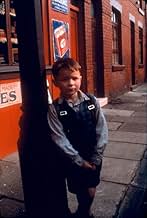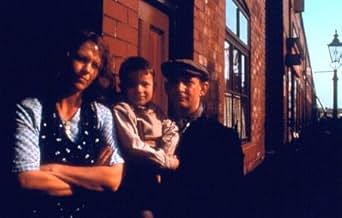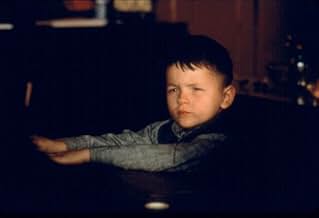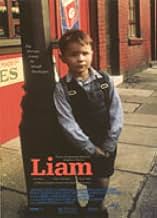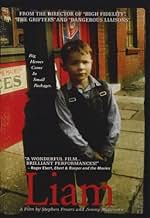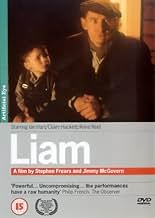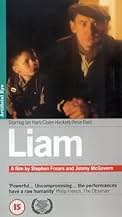IMDb RATING
6.9/10
2.7K
YOUR RATING
A family falls into poverty during the Depression.A family falls into poverty during the Depression.A family falls into poverty during the Depression.
- Awards
- 2 wins & 4 nominations total
Sylvie Gatrill
- Nunney
- (as Sylvia Gatril)
- Director
- Writer
- All cast & crew
- Production, box office & more at IMDbPro
Featured reviews
While the character young actor, Anthony Borrows, plays in this movie is apparently seven years old, Borrows himself seems to be no older than five or six. That's what--kindergarten age? As in "Ponette", I can hardly believe that these youngsters are "acting". I can't "catch" them acting! They are completely believable and their hearts and minds flash in fully-translated expression across their faces.
Even animals in movies show their training. These child-actors do not!
You should consider seeing this movie, if only to witness the amazing performance given by young Borrows!
Even animals in movies show their training. These child-actors do not!
You should consider seeing this movie, if only to witness the amazing performance given by young Borrows!
British filmmakers can and very often do lampoon their country's class system and its internecine struggles, amusing and entertaining us. Or they can, as in "Liam," starkly and powerfully bring to the screen a slice of 1930s, Depression-struck Liverpool and through a family show in microcosm the near self-destruction of a society (thank goodness for World War II).
England then (and now) is largely populated in working class industrial areas by Irish immigrants or their first-generation offspring. An uneasy peace between native-born working class families and Irish immigrants periodically erupts into dissension when times are bad. They were very bad in the early Thirties when a doctrine-bound Catholic church struggled to maintain a spiritual hold on dissatisfied and nearly penniless parishioners while Sir Oswald Mosely's British Union of Fascists took to the street offering a secular religion of bigotry and violence.
"Liam" is a little boy by that name who suffers from an inability to get words out when questioned or pressed but who can speak clearly in a sing-song voice when alone or at ease. He adores his older sister, Teresa, and basks in her returned love. "Dad" and "Mum" aren't given names, an effect that creates a sense of "Everyman(woman)". Dad is a proud laborer, at first suspicious of the church and latterly angry at its exactions of the small amount of money unemployed and underpaid workers have. Mom is just what you'd expect - an equally proud but pragmatic woman who strives every waking minute to manage her family. A son who leans far to the left politically is the constant irritant to dad's pride of place and certainty of values.
Dad loses his job and Teresa goes to work as a maid for the man who closed the factory where dad worked. Actually she is hired by his wife. At first unsuspectingly and then unwillingly she becomes a confidant and accomplice of the adulteress woman of the house. As we would say today, Teresa has "issues."
Meanwhile, back at the church and elementary school Liam and the children are besieged by priest and female teacher with an endless stream of horror stories about hell and exaltations to embrace doctrine unquestioningly. The strap is never out of employment for long. Not for a second do the older pair reveal the slightest comprehension of the brewing economic and social storm that the children face day in and day out.
Anti-Semitism has never been in short supply in England and in the 1930s its worst manifestations, fueled by the growing Nazi and Fascist movements, were acted out. Dad develops from a relatively benign reflexive anti-Semitism to full-fledged Jew hatred. Director Stephen Frears risked but avoided stereotyping by making his Jewish landlord, Jewish pawnbroker and affluent Jewish family hated simply because of who they were rather than by any grotesque manipulation of what they did in Liverpool. While several reviewers decry that the characters who were viewed as oppressors are all Jews, the reality is that this was one instance when both Irish Catholics and threatened by competition and unemployment English did unite against the visible and unfairly blamed Jews of Liverpool.
The cast is largely unknown here but their acting is superb. Anthony Borrows as Liam can't be overlooked. This little boy lives his complex role. I was drawn into their circle by the strength of the acting. Dad's family slides into a brush with true poverty realistically. Their pain and enveloping helplessness escapes the screen.
This film isn't anti-Catholic. It chronicles a church some few remember that did what it was trained to do, leaving for future generations the demand for reform and insight into the realities of family and community life. As obtuse as the priest and school teacher are, they probably imbued enough people with an unquestioning belief in the church to keep them immune from the blandishments of radicals on the left and fascists on the right. That's no small accomplishment.
8/10.
England then (and now) is largely populated in working class industrial areas by Irish immigrants or their first-generation offspring. An uneasy peace between native-born working class families and Irish immigrants periodically erupts into dissension when times are bad. They were very bad in the early Thirties when a doctrine-bound Catholic church struggled to maintain a spiritual hold on dissatisfied and nearly penniless parishioners while Sir Oswald Mosely's British Union of Fascists took to the street offering a secular religion of bigotry and violence.
"Liam" is a little boy by that name who suffers from an inability to get words out when questioned or pressed but who can speak clearly in a sing-song voice when alone or at ease. He adores his older sister, Teresa, and basks in her returned love. "Dad" and "Mum" aren't given names, an effect that creates a sense of "Everyman(woman)". Dad is a proud laborer, at first suspicious of the church and latterly angry at its exactions of the small amount of money unemployed and underpaid workers have. Mom is just what you'd expect - an equally proud but pragmatic woman who strives every waking minute to manage her family. A son who leans far to the left politically is the constant irritant to dad's pride of place and certainty of values.
Dad loses his job and Teresa goes to work as a maid for the man who closed the factory where dad worked. Actually she is hired by his wife. At first unsuspectingly and then unwillingly she becomes a confidant and accomplice of the adulteress woman of the house. As we would say today, Teresa has "issues."
Meanwhile, back at the church and elementary school Liam and the children are besieged by priest and female teacher with an endless stream of horror stories about hell and exaltations to embrace doctrine unquestioningly. The strap is never out of employment for long. Not for a second do the older pair reveal the slightest comprehension of the brewing economic and social storm that the children face day in and day out.
Anti-Semitism has never been in short supply in England and in the 1930s its worst manifestations, fueled by the growing Nazi and Fascist movements, were acted out. Dad develops from a relatively benign reflexive anti-Semitism to full-fledged Jew hatred. Director Stephen Frears risked but avoided stereotyping by making his Jewish landlord, Jewish pawnbroker and affluent Jewish family hated simply because of who they were rather than by any grotesque manipulation of what they did in Liverpool. While several reviewers decry that the characters who were viewed as oppressors are all Jews, the reality is that this was one instance when both Irish Catholics and threatened by competition and unemployment English did unite against the visible and unfairly blamed Jews of Liverpool.
The cast is largely unknown here but their acting is superb. Anthony Borrows as Liam can't be overlooked. This little boy lives his complex role. I was drawn into their circle by the strength of the acting. Dad's family slides into a brush with true poverty realistically. Their pain and enveloping helplessness escapes the screen.
This film isn't anti-Catholic. It chronicles a church some few remember that did what it was trained to do, leaving for future generations the demand for reform and insight into the realities of family and community life. As obtuse as the priest and school teacher are, they probably imbued enough people with an unquestioning belief in the church to keep them immune from the blandishments of radicals on the left and fascists on the right. That's no small accomplishment.
8/10.
Having seen the (in my opinion excellent) "Dirty Pretty Things" before, I knew pretty well what to expect from Stephen Frears. I expected to see a socially engaged drama and that's exactly what I got. This time however, the movie is situated during the time of the Depression and not at the present day. But being very interested in that time period, that was just another fine reason to watch this movie.
It tells the story of two young children in Liverpool during the Depression, called Liam and Teresa. When their dad loses his job at the ship yard, their family is facing very difficult times. Blaming the cheap Irish labor and the rich Jewish owners, their dad joins the fascists. In the mean time Liam is about to make his first Holy Communion, which makes it even more difficult for the poor family, because it will cost them too much money on new clothes. Their father, too proud and stubborn to ask for help, hating the church for their immoral behavior (monthly asking for more money, while they already have so much and the family hasn't got anything left) and hating all people who aren't 'English' he decides to go for drastic measures. But just as his hatred reaches its top, it will all explode into his own face...
When you aren't able to face criticism on the Catholic church, you better don't even think about watching this movie. You'll find plenty of it from the beginning until the end and I know that not too many people like that or are able to cope with it, believing that it is not true or perhaps exaggerated. But it has to be said that it isn't wrong. Despite what many of you might believe, this was really the way how it all went at that time (My mother told me several times that even in the fifties and sixties this was still common practice). However, when you are able to cope with that anti-religious 'fanatism', you'll see that this is a very good and relevant social drama. The story does a very good job in showing the poverty, the rise of fascism, the desperation and the tough grip that the Catholic church had on the ordinary man and woman. Of course, this story would have been nothing if it hadn't been supported by a fine cast. Especially the young Anthony Borrows did a very nice job, but the other actors like Ian Hart, Claire Hackett, Megan Burns,... sure deserve to be mentioned as well.
Overall this is a very nice movie with a very good story, some fine acting and a sober, but powerful message. I really liked what I saw and I consider this as the second hit for Stephen Frears. I give it a 7.5/10.
It tells the story of two young children in Liverpool during the Depression, called Liam and Teresa. When their dad loses his job at the ship yard, their family is facing very difficult times. Blaming the cheap Irish labor and the rich Jewish owners, their dad joins the fascists. In the mean time Liam is about to make his first Holy Communion, which makes it even more difficult for the poor family, because it will cost them too much money on new clothes. Their father, too proud and stubborn to ask for help, hating the church for their immoral behavior (monthly asking for more money, while they already have so much and the family hasn't got anything left) and hating all people who aren't 'English' he decides to go for drastic measures. But just as his hatred reaches its top, it will all explode into his own face...
When you aren't able to face criticism on the Catholic church, you better don't even think about watching this movie. You'll find plenty of it from the beginning until the end and I know that not too many people like that or are able to cope with it, believing that it is not true or perhaps exaggerated. But it has to be said that it isn't wrong. Despite what many of you might believe, this was really the way how it all went at that time (My mother told me several times that even in the fifties and sixties this was still common practice). However, when you are able to cope with that anti-religious 'fanatism', you'll see that this is a very good and relevant social drama. The story does a very good job in showing the poverty, the rise of fascism, the desperation and the tough grip that the Catholic church had on the ordinary man and woman. Of course, this story would have been nothing if it hadn't been supported by a fine cast. Especially the young Anthony Borrows did a very nice job, but the other actors like Ian Hart, Claire Hackett, Megan Burns,... sure deserve to be mentioned as well.
Overall this is a very nice movie with a very good story, some fine acting and a sober, but powerful message. I really liked what I saw and I consider this as the second hit for Stephen Frears. I give it a 7.5/10.
Move a Dickens story up into the time of the Depression. Add elements of Steinbeck's "Grapes of Wrath." Add the blackshirt Fascists from "1900." Add a little boy whose father and brother are involved in desperate economic problems complete with unions and favoritism, as in "Billy Elliot."
Make it very dark, and very drear. Let the camera see drearily, smokily, darkly, unclearly.
Let the characters speak in their own, natural way, without regard to an American audience having difficulty understanding them.
This is "Liam." It is an indictment of religion, the undeniable caste system of the UK, and of government in general. It is a film that was difficult to watch, although never did I say anything like "this is bad." It was just difficult to watch.
Everything rang true, and it was heartbreaking, with a few uplifting moments...but very few. This is an excellent film, a very well-acted film, well-directed and with an excellent screenplay. But difficult to watch, in spots.
Make it very dark, and very drear. Let the camera see drearily, smokily, darkly, unclearly.
Let the characters speak in their own, natural way, without regard to an American audience having difficulty understanding them.
This is "Liam." It is an indictment of religion, the undeniable caste system of the UK, and of government in general. It is a film that was difficult to watch, although never did I say anything like "this is bad." It was just difficult to watch.
Everything rang true, and it was heartbreaking, with a few uplifting moments...but very few. This is an excellent film, a very well-acted film, well-directed and with an excellent screenplay. But difficult to watch, in spots.
I found this a very well-rounded film. Fabulous performances given by all and in particular the young boy playing Liam. Not overly indulged with the writers opinions and not given so much information that the audience couldn't think for themselves. Nice visual touches and only 90 minutes long!
Did you know
- TriviaTheatrical film debut of Anthony Borrows.
- ConnectionsFeatured in Siskel & Ebert: Don't Say a Word/Liam/Zoolander/Go Tigers! (2001)
- How long is Liam?Powered by Alexa
Details
Box office
- Budget
- £1,600,000 (estimated)
- Gross US & Canada
- $1,016,021
- Opening weekend US & Canada
- $44,399
- Sep 23, 2001
- Gross worldwide
- $1,945,689
- Runtime
- 1h 30m(90 min)
- Color
- Sound mix
- Aspect ratio
- 1.85 : 1
Contribute to this page
Suggest an edit or add missing content


